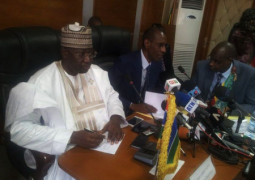The Department of Water Resources under the Global Climate Change Alliance of European Union funded support to Gambia Integrated Coastal Zone Management and Mainstreaming project has organised two days step down training workshop for North Bank Regional Technical Advisory Committee, extension workers and community members on impact of climate change, resilience building, mainstreaming, mitigation and adaptation.
The training was to strengthen public awareness and enable participants to become key actors in combating climate change and improve peoples’ livelihood.
Alpha Jallow, UNFCC focal person on climate change at the Ministry of Environment, Forestry, Climate Change, Water, Fisheries, Parks and Wildlife, said the training was also to enhance the capacity and understanding on key concept of climate change, climate variability and mainstreaming climate change in to all sectors of national development objectives.
Governor Lamin Queen Jammeh of NBR underscored the government’s commitment in creating an environment conducive for actors to support climate change adaptation and mitigation.
He called on stakeholders to effectively disseminate the effects of climate change on food production and on peoples’ livelihood.
Governor Jammeh described the step down training as important as it will create more public awareness and bring about positive behavioural and attitudinal change towards climate change.
Tijan Bojang, meteorologist at the Department of Water Resources, said the project would support mainstreaming of climate change issues into planning, budgeting, decision making and investment.
He said evidence has shown that climate change is real as it affects every sector of the economy including food security.
He disclosed that a draft national climate change and adaptation policy is formulated to enhance better coordination measures on climate change.
Bojang used the moment to call on the farming population to forge stronger partnership with frontline extension workers on adoption of best farming practices and to utilise climate change resilient crops to boost food security and sustainable development.
Chief Fabala Fadia Kinteh of Lower Badibou called on people to utilise weather forecast and early warning information to enhance disaster risk reduction.
Read Other Articles In Article (Archive)

Fatty leads high level delegation to Dakar security cooperation summit
Aug 17, 2017, 11:19 AM




